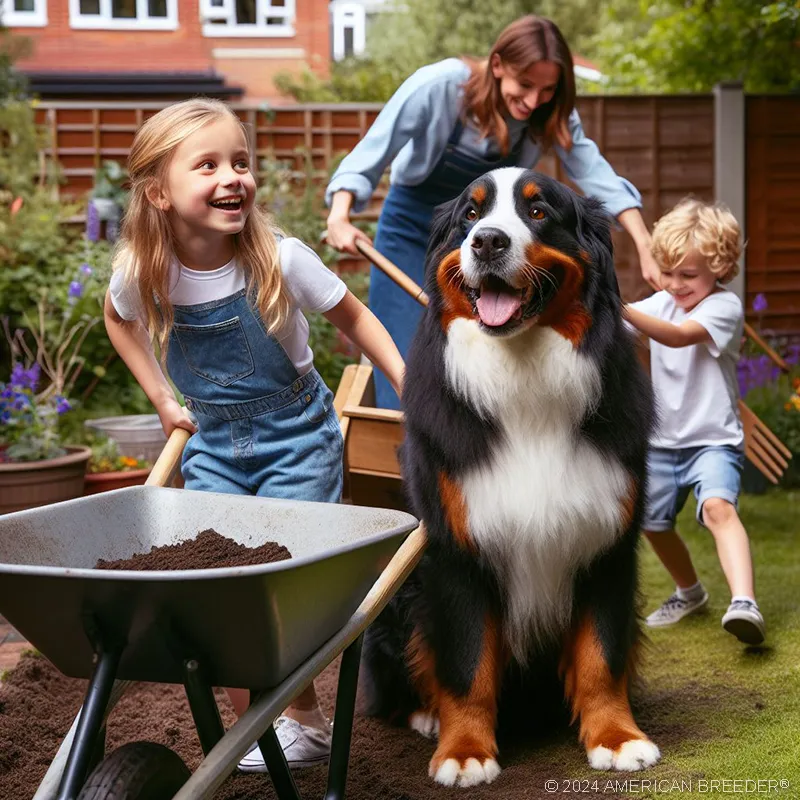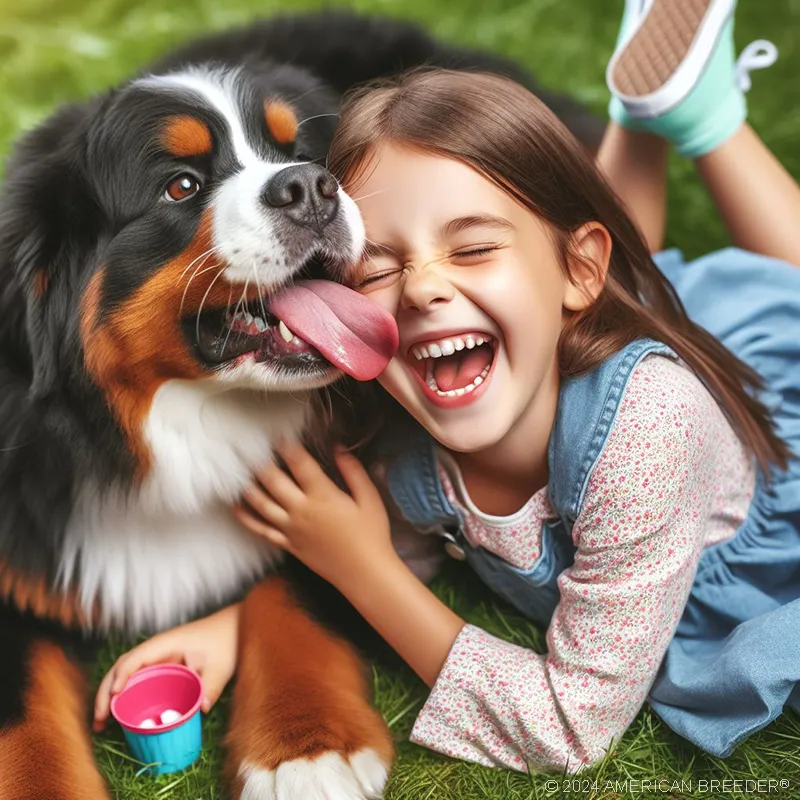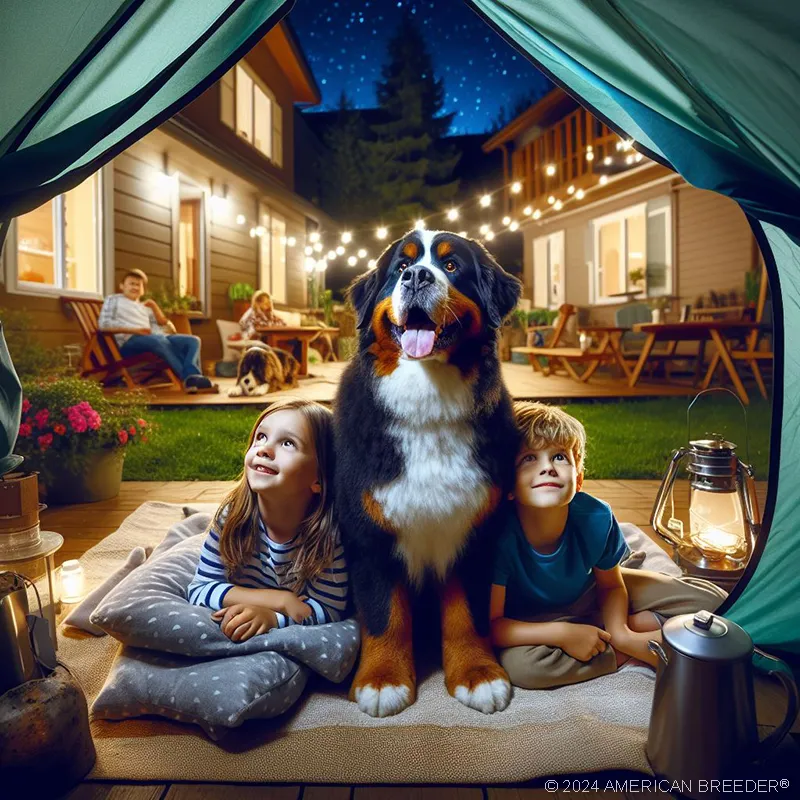The Definitive Handbook on Bernese Mountain Dogs
Introduction: Discovering the Bernese Mountain Dog
 Welcome to the captivating world of the Bernese Mountain Dog! This breed, often referred to as the "gentle giant," combines a majestic appearance with a heartwarming temperament. As you embark on this journey, prepare to uncover the myriad facets of this remarkable companion. From their origins in the Swiss Alps to their role as cherished family members, the Bernese Mountain Dog has left an indelible mark on the hearts of many.
Welcome to the captivating world of the Bernese Mountain Dog! This breed, often referred to as the "gentle giant," combines a majestic appearance with a heartwarming temperament. As you embark on this journey, prepare to uncover the myriad facets of this remarkable companion. From their origins in the Swiss Alps to their role as cherished family members, the Bernese Mountain Dog has left an indelible mark on the hearts of many.
A Brief Overview of the Bernese Mountain Dog
Considerations Before Choosing the Bernese Mountain Dog
Before bringing a Bernese Mountain Dog into your life, it's essential to assess your lifestyle, living situation, and commitment. These dogs thrive in loving and attentive homes that provide ample exercise, mental stimulation, and social interaction. Given their size and exercise needs, they are best suited for families with a spacious yard or access to outdoor activities. Their thick coats require regular grooming, so be prepared for routine brushing and maintenance.
Interesting Facts and Fun Facts about the Bernese Mountain Dog
Did you know that Bernese Mountain Dogs are one of the four Swiss mountain dog breeds? They were initially bred as versatile working dogs, assisting farmers with various tasks such as herding cattle, pulling carts, and guarding property. The distinctive tricolored coat of the Bernese Mountain Dog features black, white, and rust markings, which serve as a visual representation of their Swiss heritage. Despite their large size, they are known for their gentle and affectionate nature, making them wonderful companions for families and individuals alike.
Delving into the Bernese Mountain Dog's Origins
 Origin and Development of the Bernese Mountain Dog
Origin and Development of the Bernese Mountain Dog
The roots of the Bernese Mountain Dog trace back to the Swiss Alps, where they were bred as working dogs by Swiss farmers. These dogs were integral to daily life, helping with tasks such as herding livestock and pulling carts laden with produce to market. Their impressive strength, endurance, and ability to navigate challenging terrains made them invaluable partners in the rugged Alpine landscape.
Historical Significance or Cultural Relevance
Throughout history, the Bernese Mountain Dog's strength and reliability made them highly valued among Swiss farmers and dairymen. These dogs were not only skilled workers but also loyal companions, often accompanying their owners on long journeys through the mountains. Their affectionate nature and protective instincts made them cherished members of the family, embodying the enduring bond between humans and dogs.
Purpose or Original Use of the Bernese Mountain Dog
The Bernese Mountain Dog's original purpose was multifaceted. Beyond their roles as herders and draft animals, they also served as watchdogs, alerting farmers to potential dangers and intruders. Their presence brought comfort to those working in remote Alpine regions, offering companionship and a source of warmth during cold nights. Today, while their working roles have evolved, their loyalty and versatility continue to make them exceptional companions, therapy dogs, and even search and rescue partners.
Unveiling the Bernese Mountain Dog's Appearance
 Size, Weight, Activity Level, and Physical Appearance
Size, Weight, Activity Level, and Physical Appearance
The Bernese Mountain Dog is a large breed, with males typically standing between 25 to 28 inches at the shoulder and females ranging from 23 to 26 inches. Their weight varies accordingly, with males weighing between 85 to 110 pounds and females between 70 to 95 pounds. Despite their size, these dogs have a moderate activity level, enjoying outdoor play and leisurely walks. Their powerful build, sturdy frame, and well-muscled physique showcase their ability to navigate challenging terrains.
Coat Type, Color Variations, and Patterns
The Bernese Mountain Dog boasts a luxurious double coat that offers protection against harsh weather. The outer coat is moderately long and straight, while the undercoat provides insulation. Their distinctive tricolor coat features a base of black with rust markings on their cheeks, legs, and eyebrows, as well as white markings on the chest and blaze. This unique coat pattern not only reflects their heritage but also contributes to their captivating appearance.
Distinctive Features or Markings
One of the most striking features of the Bernese Mountain Dog is their majestic head, complete with soulful brown eyes that exude warmth and intelligence. Their broad chest, well-developed forequarters, and sturdy legs allude to their history as capable working dogs. The white blaze on their forehead, commonly referred to as the "Swiss cross," adds to their charm and adds a touch of elegance to their regal appearance.
Average Litter Size for the Bernese Mountain Dog
The average litter size for Bernese Mountain Dogs typically ranges from 6 to 8 puppies. Due to their large size, females may require extra care and monitoring during pregnancy and whelping. It's important to provide a comfortable and quiet space for the mother and her puppies during this time, ensuring that both mother and pups receive proper care and attention.
Unraveling the Bernese Mountain Dog's Temperament
 Typical Temperament Traits and Behavior Tendencies
Typical Temperament Traits and Behavior Tendencies
The Bernese Mountain Dog's temperament is a harmonious blend of affection, gentleness, and loyalty. They are renowned for their sweet and gentle nature, making them excellent companions for families, children, and even other pets. Their calm and patient disposition allows them to excel in therapy work, providing comfort and solace to those in need.
Energy Levels and Activity Requirements
Despite their imposing size, Bernese Mountain Dogs have a moderate energy level. They enjoy leisurely walks, playtime, and outdoor activities, but they are not as high-energy as some other breeds. While they don't require intense exercise, regular walks and mental stimulation are essential to keep them physically and mentally satisfied.
Compatibility with Different Lifestyles and Family Dynamics
The Bernese Mountain Dog's adaptable nature allows them to thrive in various lifestyles and family dynamics. They are equally content in a quiet suburban home or a more rural environment with plenty of space to roam. Whether you're a family with children, a single individual, or a senior seeking companionship, the Bernese Mountain Dog's affectionate and adaptable temperament makes them a wonderful addition to any household.
List of Typical Behavior Issues
While the Bernese Mountain Dog is known for their amiable nature, like any breed, they may exhibit certain behavior issues if not properly trained and socialized. Some Bernese Mountain Dogs may display separation anxiety when left alone for extended periods, leading to destructive behaviors. Proper training, positive reinforcement, and gradually increasing their independence can help alleviate this issue.
Aggression and Biting: Bernese Mountain Dogs are generally not prone to aggression or biting, as their temperament is characterized by friendliness and gentleness. However, like all dogs, early socialization, positive reinforcement training, and clear boundaries are essential to ensure that they develop well-adjusted behavior. Ensuring that they have positive interactions with people and other animals from a young age can help prevent any aggressive tendencies. Excessive Barking: While Bernese Mountain Dogs are not particularly known for excessive barking, they may bark to alert their owners of perceived threats or unfamiliar sounds. It's crucial to address this behavior through consistent training and redirecting their attention when unnecessary barking occurs. Providing mental stimulation and engaging activities can also help curb their desire to bark excessively.
Excessive Barking: While Bernese Mountain Dogs are not particularly known for excessive barking, they may bark to alert their owners of perceived threats or unfamiliar sounds. It's crucial to address this behavior through consistent training and redirecting their attention when unnecessary barking occurs. Providing mental stimulation and engaging activities can also help curb their desire to bark excessively.
Digging Behavior: Some Bernese Mountain Dogs may display digging behavior, especially if they are bored or seeking attention. Ensuring they have a designated digging area in the yard and offering plenty of physical and mental activities can help redirect their digging instincts and prevent unwanted holes in your yard.
Separation Anxiety: Due to their strong bond with their families, Bernese Mountain Dogs may experience separation anxiety when left alone for extended periods. Gradually acclimating them to alone time, providing engaging toys, and establishing a consistent routine can help alleviate separation anxiety and prevent destructive behaviors.
Resource Guarding: While Bernese Mountain Dogs are generally good-natured, some individuals may exhibit resource guarding behavior. This involves protecting their food, toys, or other belongings from perceived threats. Early training that emphasizes sharing and positive interactions can help prevent resource guarding tendencies.
Fear and Phobias: Bernese Mountain Dogs' gentle disposition makes them less likely to develop extreme fears or phobias. However, it's important to expose them to a variety of experiences and stimuli during their socialization period to ensure they grow up confident and well-adjusted. Positive reinforcement and patience are key to helping them overcome any fears they may encounter.
By understanding these potential behavior issues and taking proactive measures to address them through training, socialization, and a nurturing environment, you can ensure that your Bernese Mountain Dog is a well-mannered and harmonious companion.
Unveiling Trainability and Intelligence
Trainability Level and Ease of Learning
Bernese Mountain Dogs are intelligent and willing learners, making them moderately trainable. They have a strong desire to please their owners and are responsive to positive reinforcement techniques. However, their independent streak and occasional stubbornness may require patience and consistent training methods. Early and ongoing training, along with a firm yet gentle approach, will help them develop into well-behaved and obedient companions. Willingness to Please Their Owner
Willingness to Please Their Owner
The Bernese Mountain Dog's eagerness to please their owner is one of their endearing traits. Their loyalty and affectionate nature drive them to seek approval and engage in activities that strengthen their bond with their human companions. This willingness to please makes training sessions enjoyable for both dog and owner, as they strive to meet expectations and earn praise.
Intelligence and Problem-Solving Abilities
Bernese Mountain Dogs rank high in intelligence due to their history as working dogs that needed to think on their feet to assist with various tasks. They possess problem-solving abilities that enable them to navigate challenges and find solutions. This intelligence can be harnessed through interactive puzzles, training games, and activities that engage their minds and prevent boredom.
Recommended Training Approaches and Techniques
Positive reinforcement training methods are particularly effective with Bernese Mountain Dogs. These methods involve rewarding desired behaviors with treats, praise, or play, creating a positive association with learning and following commands. Consistency, patience, and clear communication are essential for successful training. Utilizing a variety of training techniques, such as clicker training and reward-based training, can keep sessions engaging and productive.
Training or Skills Best Suited for the Bernese Mountain Dog
Bernese Mountain Dogs excel in a variety of training areas due to their intelligence and versatility. They are well-suited for basic obedience training, such as sit, stay, and recall commands. Additionally, they thrive in more advanced activities like agility, rally obedience, and even therapy work. Their gentle nature and willingness to learn make them wonderful candidates for these specialized training endeavors.
By embracing their intelligence, cultivating their willingness to please, and employing positive reinforcement training techniques, you can unlock the full potential of your Bernese Mountain Dog's trainability and ensure a well-rounded and obedient companion.
Practical Considerations for Living with a Bernese Mountain Dog
 Size of Sleeping Quarters Depending on Size
Size of Sleeping Quarters Depending on Size
When accommodating a Bernese Mountain Dog, it's important to consider their size and provide a comfortable sleeping area that allows them to stretch out. Invest in a spacious dog bed or crate that can accommodate their adult size, providing them with a cozy retreat where they can rest and relax.
Typical Annual Veterinary Cost
The annual veterinary costs for a Bernese Mountain Dog can vary based on factors such as location, preventive care, and potential health issues. On average, you can expect to spend between $500 to $1,000 on routine veterinary expenses, including vaccinations, check-ups, and preventive medications. It's advisable to budget for unexpected medical expenses as well, which can be managed through pet insurance or a dedicated emergency fund.
Type of Grooming and Annual Cost
Bernese Mountain Dogs have a beautiful double coat that requires regular grooming to keep it healthy and free from mats. Regular brushing is essential to prevent shedding and maintain the coat's quality. While grooming costs can vary by location and services needed, you can anticipate spending around $400 to $600 annually on professional grooming. Additionally, investing in high-quality grooming tools and supplies will contribute to maintaining their coat at home.
Daily Exercise Needs and Requirements
Due to their working heritage, Bernese Mountain Dogs have moderate exercise needs. Aim for at least 30 to 60 minutes of daily exercise through walks, playtime, and mental enrichment activities. Engaging them in activities like fetch, hiking, and puzzle games not only meets their physical requirements but also keeps their intelligent minds stimulated and content.
Level of Playfulness
Bernese Mountain Dogs exhibit a moderate level of playfulness, enjoying interactive play sessions with their owners. They are known for their gentle and patient nature, making them great playmates for children and other dogs. Engaging in games like tug-of-war, fetch, and hide-and-seek can provide both physical activity and bonding opportunities. Level of Intelligence
Level of Intelligence
Bernese Mountain Dogs rank high in intelligence, which contributes to their trainability and problem-solving abilities. They thrive on mental challenges and enjoy tasks that require them to think and strategize. Incorporating activities that stimulate their minds, such as puzzle toys and obedience training, can help harness their intelligence and prevent boredom.
Affection Level and Desired Attention
Bernese Mountain Dogs are affectionate and thrive on human companionship. They form strong bonds with their families and seek close interaction. Providing regular physical affection, cuddle time, and engaging activities reinforces their bond with you and helps prevent separation anxiety.
Friendliness Toward Strangers
Bernese Mountain Dogs are typically friendly and welcoming toward strangers, which makes them poor candidates for guard dogs. Their gentle demeanor and willingness to greet newcomers with wagging tails and friendly behavior make them wonderful companions in social settings and family gatherings.
Grooming Needs and Frequency
Maintaining a Bernese Mountain Dog's coat requires regular grooming to prevent mats and keep their fur healthy. Brush their coat at least a few times a week to remove loose hair and prevent tangles. During shedding seasons, daily brushing can help manage the amount of hair in your home. Additionally, their ears should be regularly checked and cleaned to prevent infections.
Feeding Requirements and Dietary Considerations
As a large breed, Bernese Mountain Dogs have specific nutritional needs. Feed them a high-quality dog food formulated for their size, age, and activity level. Divide their daily portion into two or three meals to prevent the risk of bloat, a condition that large breeds are prone to. Avoid overfeeding to prevent obesity, as excess weight can strain their joints.
Health and Care for a Happy Bernese Mountain Dog
Common Health Issues or Predispositions of Bernese Mountain Dogs
While Bernese Mountain Dogs are generally healthy, they are susceptible to certain genetic health issues due to their breeding history. Common concerns include hip and elbow dysplasia, which can lead to joint problems. They may also be prone to certain cancers, including histiocytic sarcoma. Regular veterinary check-ups and early intervention can help manage these potential health risks.
Allergies and Specific Dietary Considerations
Some Bernese Mountain Dogs may develop allergies, which can manifest as skin irritations or gastrointestinal issues. To address allergies, work closely with your veterinarian to identify potential allergens and adjust their diet accordingly. Limited-ingredient or hypoallergenic diets may be recommended to manage allergic reactions. Lifespan and Longevity Expectations
Lifespan and Longevity Expectations
Bernese Mountain Dogs have an average lifespan of 7 to 10 years. Responsible breeding practices and maintaining a healthy lifestyle can contribute to a longer and healthier life for your furry companion. Regular exercise, a balanced diet, and routine veterinary care are essential factors in ensuring their overall well-being.
Grooming Requirements Based on Coat Type and Size
Bernese Mountain Dogs have a thick double coat that requires regular grooming to keep it in optimal condition. Brushing their coat not only prevents mats and tangles but also distributes natural oils for a healthy shine. During shedding seasons, more frequent brushing helps manage the shedding process and keeps your home cleaner.
Exercise Needs and Recommendations for Physical and Mental Stimulation
To keep your Bernese Mountain Dog physically and mentally stimulated, provide daily exercise that includes both physical activity and mental challenges. Engaging in activities like brisk walks, interactive play sessions, and puzzle toys can prevent boredom and help maintain their overall health and well-being.
Nutrition and Feeding Guidelines
A balanced and nutritious diet is essential for the health and longevity of your Bernese Mountain Dog. Feed them a high-quality commercial dog food that meets their nutritional needs. Consult your veterinarian for specific feeding guidelines based on their age, weight, and activity level. Proper nutrition plays a vital role in their growth, energy levels, and overall health.
Vaccination Schedule and Preventive Care
Follow a veterinarian-recommended vaccination schedule to protect your Bernese Mountain Dog from common diseases. Core vaccines, which include protection against rabies, distemper, parvovirus, and adenovirus, are essential. Depending on your dog's lifestyle and geographic location, non-core vaccines may also be recommended. Regular preventive care, including flea and tick prevention and regular health check-ups, contributes to their well-being.
Regular Health Check-ups and Vet Visits
Regular veterinary check-ups are crucial for detecting potential health issues early and ensuring your Bernese Mountain Dog's well-being. Schedule annual wellness exams, dental check-ups, and vaccinations as recommended by your veterinarian. These visits provide an opportunity for your veterinarian to monitor their health and address any concerns promptly.
Signs of Potential Health Problems and When to Seek Veterinary Attention
Being attentive to signs of illness or discomfort in your Bernese Mountain Dog is essential for their health. Common signs of health issues may include changes in appetite, energy levels, mobility, or behavior. If you notice any unusual symptoms or behaviors, consult your veterinarian for a proper diagnosis and treatment plan.
Socialization and Compatibility of Bernese Mountain Dogs
Interaction with Children, Other Pets, and Strangers
Bernese Mountain Dogs are known for their gentle and friendly nature, making them excellent companions for children and families. They are generally patient and tolerant of children's playful interactions. Additionally, their social and adaptable personality enables them to get along well with other pets, including dogs and cats. They often form strong bonds with their human and animal family members. Socialization Needs and Tips for Proper Socialization
Socialization Needs and Tips for Proper Socialization
Proper socialization during puppyhood is vital for shaping your Bernese Mountain Dog's social behavior and ensuring they grow up to be well-adjusted adults. Expose them to various environments, sounds, sights, and people to build their confidence and reduce the likelihood of fear or anxiety later in life. Enroll them in puppy socialization classes where they can interact with other puppies and learn valuable social skills. Gradually introduce them to different animals and situations, always using positive reinforcement to create positive associations.
Precautions or Considerations for Multi-Dog Households
If you're considering adding a Bernese Mountain Dog to a household with other dogs, it's important to take precautions to ensure a harmonious introduction. Slow and supervised introductions are key to allowing dogs to establish positive relationships. Watch for signs of discomfort or aggression and be prepared to intervene if needed. Providing separate spaces, feeding areas, and toys can help prevent potential conflicts.
Level of Ease When It Comes to Training Bernese Mountain Dogs
Bernese Mountain Dogs are intelligent and eager to please, which makes them relatively easy to train. They respond well to positive reinforcement training methods, including treats, praise, and rewards. Keep training sessions engaging and enjoyable to maintain their interest. Consistency, patience, and a calm demeanor are essential for successful training outcomes.
Playtime and Exercise with Other Dogs or Pets
Bernese Mountain Dogs often enjoy playing and interacting with other dogs and pets. Their friendly and gentle demeanor helps them get along with various animals. However, always supervise their interactions, especially during play, to ensure that everyone is comfortable and safe. Engage them in group play sessions, walks, and activities that allow them to socialize and burn off energy.
Dog-Friendly Activities and Outings
Engaging in activities with your Bernese Mountain Dog not only strengthens your bond but also provides mental and physical stimulation. They love being included in family outings and adventures. Consider taking them on nature hikes, camping trips, or visits to dog-friendly beaches. These experiences enhance their socialization, boost their confidence, and offer opportunities for exercise.
Living Arrangements and Training for Bernese Mountain Dogs
Suitability for Different Living Arrangements
Bernese Mountain Dogs can adapt to various living arrangements, including apartments, houses, and rural areas. While they are more commonly associated with larger spaces, they can thrive in apartment living if provided with ample exercise and mental stimulation. Houses with yards offer more room for them to play, but proper exercise and enrichment are key regardless of your living situation.
Space Requirements and Exercise Options
In homes with yards, Bernese Mountain Dogs benefit from a secure and spacious outdoor area where they can run and play. Regular exercise is essential to prevent obesity and maintain their physical and mental well-being. Engage them in activities like fetch, agility courses, and long walks to meet their exercise needs. Interactive toys and puzzles can also keep their minds sharp indoors.
Climate Considerations and Adaptability
Bernese Mountain Dogs have a thick double coat that provides insulation in colder climates. While they can tolerate colder temperatures, be mindful of extreme weather conditions, and provide appropriate shelter and protection. In hotter climates, ensure they have access to shade, cool water, and air-conditioned environments to prevent overheating.
Recommended Yard Size for Bernese Mountain Dogs
For homes with yards, a larger space is ideal for Bernese Mountain Dogs due to their size and exercise needs. A yard with ample room for them to roam, play, and explore is beneficial. However, regular exercise and mental enrichment are more important than yard size alone. Even in smaller spaces, you can meet their needs through daily walks and engaging activities.
Ideal Living Conditions and Environment
Bernese Mountain Dogs thrive in environments where they are part of the family and receive plenty of attention, exercise, and mental stimulation. They enjoy being around people and participating in family activities. Create a comfortable and inviting space indoors for them to rest, and ensure they have access to outdoor play areas. Consistent routines and positive interactions contribute to their overall happiness
Training and Obedience for a Well-Behaved Bernese Mountain Dog
Basic Obedience Training and Commands
Start training your Bernese Mountain Dog with basic commands such as "sit," "stay," "down," and "come." Positive reinforcement methods, using treats and praise, work well with this breed. Consistency and patience are key, and short training sessions spread throughout the day are effective in preventing boredom and maintaining their focus.
Advanced Training or Specialized Activities Suited for Bernese Mountain Dogs
Once your Bernese Mountain Dog has mastered basic obedience, consider engaging them in advanced training or specialized activities. They excel in various canine sports such as agility, obedience trials, and even therapy work. Their willingness to please and high intelligence make them quick learners in these endeavors, providing mental and physical stimulation.
Behavioral Challenges or Specific Training Considerations
Bernese Mountain Dogs, like any breed, may face behavioral challenges that require attention and training. Address any issues like barking, digging, or jumping through positive reinforcement training. Seek professional guidance if needed, especially when dealing with more complex behaviors. Consistency, clear communication, and rewarding desirable behavior are key to successful training outcomes.
House Training and Potty Training Tips
House training your Bernese Mountain Dog requires patience and consistency. Set a routine for bathroom breaks and take them outside after eating, waking up, and playing. Use positive reinforcement and praise when they eliminate outdoors. Be vigilant and supervise them indoors until they establish good habits. Crate training can aid in preventing accidents and providing a safe space.
Leash Training and Walking Etiquette
Leash training is essential for a well-behaved Bernese Mountain Dog during walks. Start training with a well-fitted harness or collar and a sturdy leash. Use positive reinforcement to reward loose-leash walking and discourage pulling. Consistent training and providing mental stimulation during walks help maintain their focus and prevent boredom.
Exercise and Activity for a Happy Bernese Mountain Dog
Daily Exercise Needs and Recommendations
Adequate daily exercise is vital to the physical and mental well-being of a Bernese Mountain Dog. Aim for 30 to 60 minutes of moderate exercise, which can include walks, playtime, and mental enrichment activities. Engage them in activities that challenge their minds and bodies, keeping them content and preventing behavioral issues.
Mental Stimulation Activities and Games
Incorporate mental stimulation into your Bernese Mountain Dog's routine to keep their intelligent minds engaged. Puzzle toys, treat-dispensing games, and obedience training sessions provide cognitive challenges. Regularly introducing new activities and tasks prevents boredom and encourages problem-solving skills.
Exercise Routines and Activity Ideas
Variety is key when planning exercise routines for your Bernese Mountain Dog. Combine brisk walks, jogging, and playtime to keep them physically active. Explore different environments, such as parks, trails, and beaches, to provide new sensory experiences. Engage them in activities like hide-and-seek or scent games to keep their minds sharp.
Energy Outlets for High-Energy Breeds
While Bernese Mountain Dogs have moderate energy levels, it's important to provide outlets for their energy, especially during their younger years. Engage in vigorous play sessions, offer challenging toys, and involve them in activities that allow them to burn off excess energy. This not only promotes their physical health but also prevents behavioral issues caused by boredom.
Financial Planning and Responsible Ownership for Bernese Mountain Dogs
Typical Price Range for Purchasing a Bernese Mountain Dog
The cost of purchasing a Bernese Mountain Dog can vary based on factors such as the breeder's reputation, lineage, and location. On average, you can expect to pay between $1,500 to $2,500 for a Bernese Mountain Dog puppy from a reputable breeder. Be cautious of prices that seem too good to be true, as they might indicate questionable breeding practices.
Initial Costs and Ongoing Expenses
Before bringing a Bernese Mountain Dog into your home, consider the initial costs, including adoption fees or purchase price, vaccinations, spaying/neutering, and microchipping. Ongoing expenses include high-quality dog food, grooming supplies, regular veterinary care, training, toys, and potential medical emergencies. Budgeting for these costs ensures you can provide the best care for your furry companion.
Considerations for Pet Insurance and Unexpected Medical Costs
Pet insurance can provide financial peace of mind by helping to cover unexpected medical expenses. Consider investing in a comprehensive pet insurance plan that covers accidents, illnesses, and preventive care. This safeguard ensures that your Bernese Mountain Dog receives the medical attention they need without causing financial strain.
Options for Pet Care During Vacations or Travel
Planning for your Bernese Mountain Dog's care during vacations or travel is crucial. You can opt for professional pet boarding services, hire a trusted pet sitter, or have a friend or family member care for your dog. Familiarize your dog with the chosen option beforehand to ensure they feel comfortable and secure while you're away.
Conclusion: Your Journey with a Bernese Mountain Dog
Summary of Key Information and Considerations
Your journey with a Bernese Mountain Dog is a fulfilling and rewarding experience that requires dedication and love. Throughout this guide, you've gained insights into their history, temperament, care needs, and more. Remember to prioritize their well-being by providing proper care, attention, and training.
Encouragement to Continue Learning and Seeking Expert Guidance
As you embark on this journey, embrace the opportunity to learn and grow as a Bernese Mountain Dog owner. Seek expert guidance, stay informed about new developments in canine care, and never hesitate to reach out to professionals or fellow owners when in doubt. Your commitment to ongoing education enhances your dog's quality of life.
Emphasis on Responsible Ownership and Providing a Loving Home
Responsible ownership is at the core of your relationship with your Bernese Mountain Dog. By ensuring their physical and mental needs are met, practicing positive training methods, and offering a loving and secure environment, you create a lasting bond built on trust, companionship, and mutual respect.
Your Bernese Mountain Dog is a remarkable companion, embodying loyalty, gentleness, and an unwavering affection for their family. With the knowledge and insights gained from this guide, you're well-equipped to embark on a fulfilling journey as a proud owner of a Bernese Mountain Dog.
Exploring Bernese Mountain Dog's Heritage and Origins
Delving Deeper into the Alps: Historical Significance
The history of the Bernese Mountain Dog is deeply intertwined with the picturesque Swiss Alps. These dogs were bred for a purpose—to assist farmers and herders in the rugged terrain of Switzerland. Their impressive strength, loyalty, and willingness to work made them invaluable assets to these communities. Over the centuries, their role expanded to include guarding, pulling carts, and providing companionship to families.
Preserving Cultural Heritage: The Role of the Bernese Mountain Dog
The Bernese Mountain Dog's presence in Swiss culture is undeniable. Their role as loyal companions to farmers and herders has left an indelible mark on the region's history and traditions. In Switzerland, they are often celebrated at local events and festivals, embodying the spirit of hard work and camaraderie that defines their heritage.
The Gentle Guardian: The Purpose of the Bernese Mountain Dog
From Farm to Family: Evolving Purpose
The Bernese Mountain Dog's original purpose as a farm and herding dog has evolved to include a cherished role as a beloved family companion. While they still possess their innate herding instincts, they excel as gentle protectors and playmates for children. Their calm and steady nature makes them excellent therapy dogs, providing comfort to those in need.
Distinctive Features: A Closer Look at the Bernese Mountain Dog
A Magnificent Coat: Coat Type and Color Variations
The Bernese Mountain Dog's coat is one of their most distinctive features. It's long, thick, and glossy, with a tri-color pattern of jet black, rust, and white. This beautiful coat not only adds to their striking appearance but also serves as insulation against the harsh Alpine climate. Regular grooming not only keeps their coat looking its best but also helps maintain their overall health and hygiene.
The Noble Expression: Bernese Mountain Dog's Face
Their face, adorned with expressive eyes and a noble expression, is a testament to their gentle and friendly nature. Their eyes radiate warmth and intelligence, reflecting their deep bond with humans. This remarkable expression is a hallmark of the breed's character and endears them to all who meet them.
Connecting with Bernese Mountain Dog's Temperament
A Heart of Gold: Bernese Mountain Dog's Temperament Traits
The Bernese Mountain Dog's temperament is a harmonious blend of gentleness, loyalty, and intelligence. Their affectionate nature makes them wonderful companions for families, including children. Their calm disposition and willingness to please make them a joy to train and interact with.
The Joy of Play: Energy Levels and Activity Requirements
While Bernese Mountain Dogs have moderate energy levels, they do enjoy play and outdoor activities. Regular exercise is essential for their physical and mental well-being. Engaging in daily walks, play sessions, and interactive games ensures they remain content and fulfilled.
Navigating Behavior and Training with a Bernese Mountain Dog
Addressing Behavioral Challenges: Fear and Phobias
Bernese Mountain Dogs are known for their sensitivity, and some may be prone to fear or phobias. It's crucial to provide them with positive experiences and gentle socialization from a young age. Early exposure to various people, animals, and environments can help prevent the development of fearful behaviors.
The Power of Positive Reinforcement: Training Techniques
Training a Bernese Mountain Dog is a rewarding endeavor, as they are eager to please and quick learners. Positive reinforcement techniques, such as using treats, praise, and rewards, work exceptionally well with their cooperative nature. This approach fosters a strong bond between you and your dog and encourages them to engage enthusiastically in training sessions.
Welcoming Bernese Mountain Dog into Your Home
Creating a Comfortable Living Space: Size of Sleeping Quarters
As a large breed, Bernese Mountain Dogs require ample space for rest and relaxation. Providing a comfortable and cozy sleeping area is essential for their well-being. Invest in a spacious and supportive dog bed that accommodates their size and offers a sense of security.
Staying Prepared for Medical Costs: Typical Annual Veterinary Cost
Maintaining your Bernese Mountain Dog's health is a top priority, and regular veterinary care is essential. While costs can vary based on location and individual health needs, budgeting for an average annual veterinary cost ensures you can provide necessary preventive care, vaccinations, and check-ups.
Grooming and Maintenance of Your Bernese Mountain Dog
Beyond Brushing: Grooming Routine for the Bernese Mountain Dog
Grooming a Bernese Mountain Dog involves more than brushing their luxurious coat. Regular care includes nail trimming, ear cleaning, dental hygiene, and occasional baths. Maintaining their hygiene not only keeps them looking their best but also contributes to their overall health and well-being.
Dietary Considerations: Feeding Requirements and Portion Control
A balanced diet is essential to the health and vitality of your Bernese Mountain Dog. Consult your veterinarian to determine the appropriate portion sizes and feeding schedule based on their age, activity level, and health condition. Choosing high-quality dog food rich in nutrients supports their growth and maintains their overall health.
Unveiling Bernese Mountain Dog's Health and Care
Proactive Health Measures: Preventive Care and Vaccination Schedule
Preventive care is key to ensuring the longevity and well-being of your Bernese Mountain Dog. Maintain a vaccination schedule that includes core vaccines and non-core vaccines recommended by your veterinarian. Regular check-ups and preventive measures such as flea and tick prevention contribute to their overall health.
Detecting Early Signs: Health Issues and Regular Check-ups
While Bernese Mountain Dogs are generally healthy, they are prone to certain genetic health issues, including hip and elbow dysplasia. Regular health check-ups allow your veterinarian to monitor their health and detect potential issues early. Be attentive to any changes in behavior, appetite, or mobility and seek veterinary attention promptly.
Integrating Bernese Mountain Dog into Your Lifestyle
Harmonious Coexistence: Interaction with Children and Pets
Bernese Mountain Dogs are renowned for their gentle and patient nature, making them wonderful companions for children. Their social and friendly disposition extends to other pets as well. Proper socialization from a young age fosters positive interactions with children and other animals, promoting a harmonious household.
Enriching Social Experiences: Dog-Friendly Activities and Outings
Engaging in dog-friendly activities and outings is essential for your Bernese Mountain Dog's mental and physical well-being. They thrive on human interaction and enjoy participating in activities like hiking, outdoor adventures, and visits to dog-friendly parks. These experiences strengthen your bond and keep them happy and fulfilled.
A Home Tailored for Bernese Mountain Dog
Suitability for Various Living Arrangements: Apartment, House, or Rural Area
Bernese Mountain Dogs adapt well to different living arrangements, including apartments, houses, and rural areas. However, their size and exercise needs must be taken into account. Providing ample space and regular outdoor activities ensures they are comfortable and content in their environment.
Creating a Dog-Friendly Backyard: Yard Size and Exercise Options
For those with a yard, creating a dog-friendly space is crucial for your Bernese Mountain Dog's well-being. A spacious yard allows them to engage in play, explore, and satisfy their natural curiosity. Including features like shaded areas, toys, and water stations enhances their outdoor experience.
Training and Obedience for a Happy Relationship
Advanced Training and Specialized Activities: Unleash Their Potential
Beyond basic obedience, Bernese Mountain Dogs excel in advanced training and specialized activities. Their intelligence and eagerness to please make them suitable candidates for roles such as therapy and service dogs. Engaging them in tasks that tap into their innate abilities fosters a sense of purpose and fulfillment.
Tailoring Training to Different Life Stages: Puppyhood to Adulthood
Training is an ongoing process that evolves as your Bernese Mountain Dog grows. During puppyhood, focus on socialization, basic commands, and potty training. As they mature, you can introduce more complex commands and advanced skills. Adulthood calls for reinforcing learned behaviors and continuing mental stimulation to keep them engaged.
Embracing Exercise and Mental Stimulation
Meeting Energy Demands: Daily Exercise Routines and Activities
Satisfying your Bernese Mountain Dog's exercise needs is essential for their physical health and mental well-being. Engage in daily walks, play sessions, and activities that challenge their problem-solving abilities. A tired dog is a happy and content dog, so aim to incorporate both physical and mental exercise into their routine.
Enrichment Activities for a Sharp Mind: Mental Stimulation Ideas
Keeping your Bernese Mountain Dog mentally stimulated is just as important as physical exercise. Enrichment activities such as puzzle toys, scent games, and training sessions challenge their intellect and prevent boredom. These activities also strengthen your bond and contribute to a well-rounded, happy canine companion.
The Ultimate Guide to Bernese Mountain Dog: A Comprehensive Summary
Capturing the Essence of Bernese Mountain Dogs
This guide has journeyed through the many facets of the Bernese Mountain Dog, offering a comprehensive understanding of their history, characteristics, care, and significance. From their Alpine origins to their gentle temperament and remarkable loyalty, every aspect of this breed has been explored.
Highlighting Unique Traits and Significance
As you embark on your journey with a Bernese Mountain Dog, remember their unique traits that make them cherished companions. Their dedication, intelligence, and affection enrich the lives of families and individuals alike. Whether serving as working dogs or providing comfort as therapy animals, their role in society is truly invaluable.
Chapter 34: Embracing the Bernese Mountain Dog: A Fulfilling Partnership
The Commitment of Responsible Ownership
Owning a Bernese Mountain Dog is a commitment that brings immeasurable joy and companionship. As you navigate the various aspects of their care and upbringing, remember the responsibility you hold as their guardian. Providing a loving, suitable home and prioritizing their well-being ensures a rewarding partnership for years to come.
Continuing the Journey of Learning and Growth
Your journey with a Bernese Mountain Dog is a continuous process of learning and growth. As you embark on walks, share moments of play, and bask in their unwavering loyalty, you'll deepen your understanding of their unique personality. The bond you share is a testament to the enduring connection between humans and their beloved canine companions.
Conclusion: Your Ultimate Companion - The Bernese Mountain Dog
The journey through this guide has uncovered the multifaceted nature of the Bernese Mountain Dog. From their Alpine heritage to their role as steadfast companions, each chapter has revealed a new layer of understanding. As you embark on your journey with this remarkable breed, armed with knowledge and insight, you're poised to forge a lasting and cherished partnership.
In your pursuit of a fulfilling relationship with a Bernese Mountain Dog, remember that their presence in your life brings immeasurable joy and companionship. From their gentle temperament to their willingness to be your loyal companion through life's adventures, they embody the qualities that make dogs such beloved members of our families.
As you navigate the responsibilities of ownership, from grooming to training and beyond, approach each challenge as an opportunity to deepen your bond and strengthen your connection. The journey may be filled with moments of laughter, learning, and growth, but it's also rich with the rewards of having a faithful friend by your side.
Whether you're considering welcoming a Bernese Mountain Dog into your home or you're already fortunate to have one as a cherished companion, may this guide serve as a comprehensive and invaluable resource. With a wealth of information at your fingertips, you're equipped to provide the best possible care for your Bernese Mountain Dog, ensuring a life filled with happiness, health, and cherished memories.
So, as you embark on this journey, let the qualities of the Bernese Mountain Dog inspire you to be the best owner you can be. Cherish their loyalty, reciprocate their affection, and embrace the responsibilities of being a dog guardian. Together, you and your Bernese Mountain Dog will create a lifelong partnership that enriches both your lives in ways beyond measure.
Bernese Mountain Dog Quick Reference Guide
Breed Background: Origin: Switzerland | Breed Purpose: Drafting, Farm Work | AKC Class: Working | Year Recognized by AKC: 1937
 Appearance: Size: Large | Weight: 70-115 lbs | Coat Type: Long, Thick Double Coat | Colors & Patterns: Tricolor (Black, White, Rust) | Distinctive Features: Triangular Ears, White Markings, Strong Build
Appearance: Size: Large | Weight: 70-115 lbs | Coat Type: Long, Thick Double Coat | Colors & Patterns: Tricolor (Black, White, Rust) | Distinctive Features: Triangular Ears, White Markings, Strong Build
Temperament: Energy Level: 3/5 | Loyalty: 5/5 | Friendliness to Pets: 4/5 | Friendliness to Strangers: 3/5 | Trainability: 3/5 | Playfulness: 3/5 | Frequent Barker: 2/5 | Chase Instincts: 2/5 | Sense of Smell: 5/5 | Drive to Hunt: 2/5
Health & Care: Health Issues: Hip Dysplasia, Cancer | Lifespan: 6-8 years | Grooming Difficulty: 3/5 | Exercise Needs: Moderate
Socialization: Interaction with Children: Gentle and Patient | Interaction with Pets: Generally Friendly | Interaction with Strangers: Cautious | Elderly Compatibility: Gentle Companion | Ease of Training: Moderate
Suitable Living Arrangements: Apartment: No | House: Yes | Rural Area: Preferred | Yard Size Requirements: Medium to Large Yard
Training & Obedience: Trainability: 3/5 | Intelligence: 3/5 | Obedience: 3/5 | Problem-Solving: 3/5 | Easily Stimulated: 2/5 | Focus Level: 3/5 | Easily Distracted: 2/5
Financial Planning: Typical Price Range: $800 - $2,500 | Initial Expenses: Puppy essentials, Training | Ongoing Annual Expenses: Food, Vet Visits
Breeding: Reproductive Maturity: 18-24 Months | Litter Frequency: 1-2 per year | Litter Size: 4-10 puppies | Stud Cost: $800 - $2,000 | Breeding Challenges: Health Screenings, Whelping Care
Did You Enjoy this Article? Share it and Help Us Spread the Word!
If you found this article helpful, we'd appreciate it if you could share it with your friends or link to it from your website, blog, or group! You can also use the convenient social share tabs on the left side of the screen to instantly share this page to your social media feed. For more ways to support and promote the American Breeder Community, visit our Share & Promote Together page for social media posts and memes you can copy and share. Your support means the world to us!
Disclaimer: The information provided in this article is for general informational purposes only and does not constitute legal, medical, financial, or professional advice. While we strive for accuracy, we make no representations or warranties regarding the completeness, accuracy, reliability, or suitability of the information. Please consult with a professional before making decisions based on the content provided. American Breeder Inc. assumes no responsibility for any errors or omissions or for the results obtained from the use of this information.
